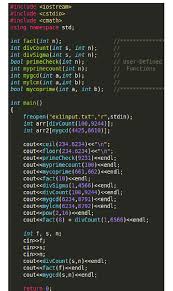Unlocking Efficiency: The Impact of Innovative Programs on Productivity

The Power of Programs: Enhancing Efficiency and Productivity
In today’s digital age, programs play a crucial role in enhancing efficiency and productivity across various industries. A program is a set of instructions designed to perform a specific task or function on a computer or other electronic device.
One of the key benefits of using programs is automation. By creating programs to automate repetitive tasks, businesses can save time and resources while reducing the risk of human error. This allows employees to focus on more strategic and creative aspects of their work, leading to increased productivity.
Programs also enable seamless communication and collaboration within organizations. With the use of specialized software programs, teams can share information, coordinate tasks, and work together towards common goals more effectively. This not only improves internal processes but also enhances overall teamwork and efficiency.
Furthermore, programs are essential for data analysis and decision-making. Advanced analytics programs can process large datasets quickly and accurately, providing valuable insights that drive informed business decisions. By leveraging the power of programs for data analysis, organizations can gain a competitive edge in today’s data-driven market.
Overall, the versatility and power of programs make them indispensable tools for modern businesses seeking to streamline operations, boost productivity, and stay ahead in a rapidly evolving digital landscape.
Top 5 Frequently Asked Questions About Programs: Understanding, Creating, and Utilizing Software in Business
- What is a program?
- How do programs enhance efficiency in businesses?
- What are the different types of programs available?
- How can I learn to create my own programs?
- What are some examples of popular programs used in various industries?
What is a program?
A program, in the context of computing and technology, refers to a set of instructions or code that is designed to perform a specific task or function on a computer or electronic device. Essentially, a program is a sequence of commands that tells the computer how to execute certain operations, ranging from simple calculations to complex data processing. Programs can come in various forms, such as software applications, scripts, or algorithms, and they play a fundamental role in enabling computers to perform tasks efficiently and accurately based on predefined logic and rules.
How do programs enhance efficiency in businesses?
Programs enhance efficiency in businesses by automating repetitive tasks, reducing the risk of human error, and saving valuable time and resources. By creating customized programs to streamline processes, businesses can improve productivity and focus on more strategic aspects of their operations. Programs also facilitate seamless communication and collaboration among teams, enabling better coordination and faster decision-making. Additionally, advanced analytics programs help businesses analyze data quickly and accurately, leading to informed decision-making and a competitive edge in the market. Overall, the use of programs in businesses plays a crucial role in optimizing workflows, increasing efficiency, and driving success in today’s fast-paced digital environment.
What are the different types of programs available?
When it comes to programs, there is a wide variety of types available to cater to different needs and functionalities. Some common types of programs include operating systems, which manage computer hardware and software resources; productivity programs like word processors and spreadsheets for creating documents and managing data; multimedia programs for editing and playing audio and video files; security programs such as antivirus software to protect against threats; and development programs for coding and software development. Each type of program serves a specific purpose, showcasing the diverse range of applications that programs offer in enhancing efficiency and productivity across various industries.
How can I learn to create my own programs?
Learning to create your own programs is an exciting journey that opens up a world of possibilities in the realm of technology and innovation. To embark on this learning path, aspiring programmers can start by gaining a solid foundation in programming languages such as Python, Java, or C++. There are numerous online resources, tutorials, and courses available that cater to beginners and provide step-by-step guidance on coding fundamentals and best practices. Practice is key when it comes to mastering programming skills, so dedicating time to hands-on projects and challenges can greatly enhance your understanding and proficiency. Additionally, joining coding communities, attending workshops, and seeking mentorship from experienced programmers can offer valuable support and insights as you strive to create your own programs. Remember, persistence and a curious mindset are essential traits that will propel you forward on your programming journey.
What are some examples of popular programs used in various industries?
In various industries, there are several popular programs that play a vital role in enhancing productivity and efficiency. For instance, in the graphic design and multimedia industry, Adobe Creative Suite programs like Photoshop, Illustrator, and InDesign are widely used for creating stunning visual content. In the field of project management, tools such as Microsoft Project and Asana help teams organize tasks and track progress effectively. For financial analysis and reporting, programs like Excel and QuickBooks are commonly utilized to manage data and generate insights. Additionally, in the healthcare sector, Electronic Health Record (EHR) systems such as Epic and Cerner streamline patient information management. These examples demonstrate how different industries leverage specific programs to optimize their operations and achieve their goals efficiently.




Leave a Comment